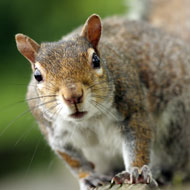
Over one in 10 squirrels infected bird strains of bacteria
A surprisingly high percentage of grey squirrels have been found to be infected with bird strains of the bacteria that causes Lyme disease.
Scientists from the University of Glasgow tested 679 squirrels from Scotland and North England to better their understanding of how grey squirrels contribute to maintaining the bacteria.
Lyme disease in humans is caused by a bite from an infected tick. Four species of the disease-causing bacteria - Borrelia burgdorferi sensu lato - are found in the UK.
Birds and rodents are thought to be the most important hosts of Borrelia bacteria, but it can infect a number of different wildlife species.
Deer are known to maintain tick populations, but do not become infected.
Glasgow researchers found ticks to be common among the squirrels tested. Around 12 per cent were infected and they could be infected with any of the four Borellia species found in the UK.
Surprisingly, the research team found the squirrels were most commonly infected with a species usually found in birds.
Lead author Caroline Millins said: “Frequent infection of grey squirrels with bird strains of Borrelia was unexpected, and challenges our current understanding of host pathogen interactions for this zoonotic pathogen."
Miss Millins added that it is not possible from this study to determine whether grey squirrels are responsible for an increase or decrease in the number of infected ticks within an area, but the data paves the way for future research.
For further information visit: www.gla.ac.uk



 The BSAVA has opened submissions for the BSAVA Clinical Research Abstracts 2026.
The BSAVA has opened submissions for the BSAVA Clinical Research Abstracts 2026.